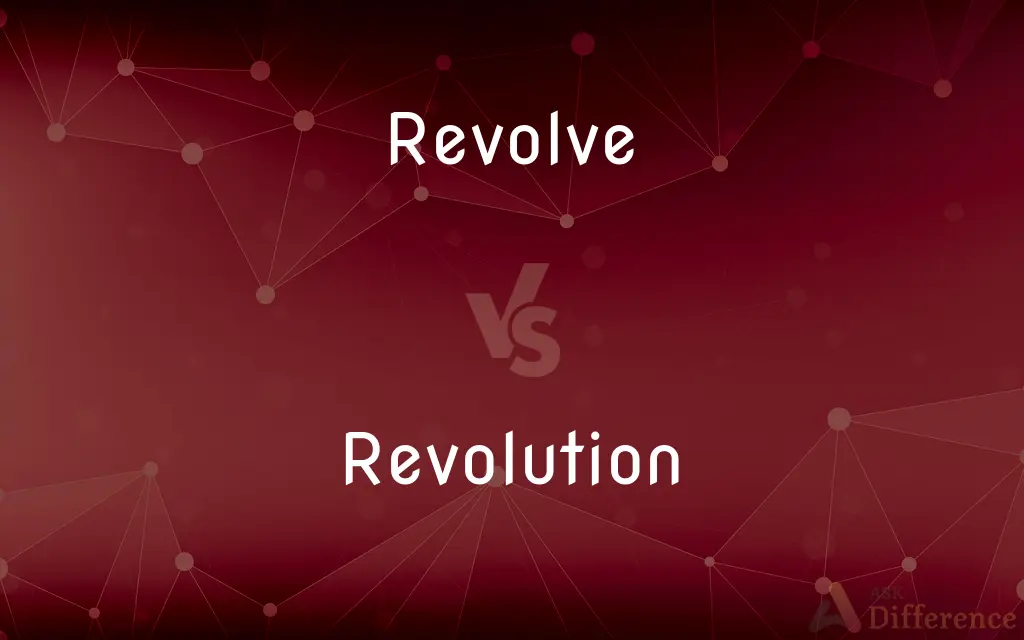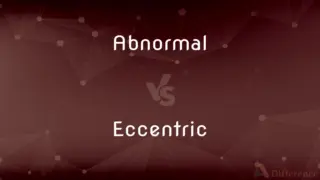Revolve vs. Revolution — What's the Difference?
By Urooj Arif & Maham Liaqat — Updated on April 23, 2024
Revolve typically means to turn around a central point or axis, while revolution can refer to a complete, transformative cycle or a radical social/political change.

Difference Between Revolve and Revolution
Table of Contents
ADVERTISEMENT
Key Differences
Revolve is generally used to describe the action of something moving in a circle or orbit around a central point, often referring to celestial bodies or mechanical parts. On the other hand, revolution can describe both the movement of an object completing a full orbit and drastic changes in political, social, or economic structures.
In physics, to revolve is to move in a curved path around a stationary point or object, such as a planet revolving around the sun. Whereas, in the context of astronomy, a revolution also signifies the complete journey an object makes around another on its path, which defines a year on that planet.
The term revolve can also be used metaphorically to describe activities or discussions that focus on a central theme or issue, revolving around a specific topic. Conversely, revolution is a term heavily laden with connotations of upheaval and profound change, often used to describe significant historical events like the American or French revolutions.
Technically, revolve implies a continuous and often repetitive motion without inherent change to the object’s structure or position other than its location. In contrast, revolution suggests a transformative cycle that often ends with a significant difference from the starting point, emphasizing outcome over process.
In everyday language, revolve is used in expressions like "revolving door," which describes a door that rotates on its axis, or situations where people or ideas come and go regularly. Revolution, however, is invoked to describe major shifts, such as in "digital revolution," referring to the radical changes brought about by digital technology.
ADVERTISEMENT
Comparison Chart
Definition
To turn around a central point or axis.
A complete, transformative cycle or major change in political, social, or economic structures.
Contexts
Physics, mechanics, everyday use.
Astronomy, history, politics, technology.
Motion Type
Circular and often repetitive.
Can be circular or transformative.
Metaphorical Use
Describing focused discussions or patterns.
Used to signify profound or radical changes.
Example Usage
Revolving door, revolving funds.
Industrial Revolution, digital revolution.
Compare with Definitions
Revolve
To move in a circular orbit around another object.
The Earth revolves around the Sun.
Revolution
A dramatic and wide-reaching change in the way something works or is organized.
The digital revolution transformed communication.
Revolve
To focus continually around a central point or theme.
The conversation revolved around future plans.
Revolution
The movement of one body in an orbit around another body.
The Moon’s revolution around the Earth takes about 27 days.
Revolve
To operate or occur in a cyclic manner.
The festival revolves on a yearly cycle.
Revolution
A successful, radical attempt to change or overthrow a government or political system.
The French Revolution began in 1789.
Revolve
To turn around on an axis.
The wheel revolves effortlessly on its axle.
Revolution
In technology, a radical change that fundamentally alters an industry.
The green revolution increased agricultural yields worldwide.
Revolve
To come back to a similar point or situation.
Fashion trends often revolve.
Revolution
A single cycle of motion in a repetitive process.
One revolution of the gear equals ten ticks.
Revolve
To orbit a central point
The planets revolve around the sun.
Revolution
In political science, a revolution (Latin: revolutio, "a turn around") is a fundamental and relatively sudden change in political power and political organization which occurs when the population revolts against the government, typically due to perceived oppression (political, social, economic) or political incompetence. In book V of the Politics, the Ancient Greek philosopher Aristotle (384–322 BC) described two types of political revolution: Complete change from one constitution to another Modification of an existing constitution.Revolutions have occurred through human history and vary widely in terms of methods, duration and motivating ideology.
Revolve
To turn on an axis; rotate.
Revolution
Orbital motion about a point, especially as distinguished from axial rotation
The planetary revolution about the sun.
Revolve
To be arranged as revolving credit
His credit line revolves.
Revolution
A turning or rotational motion about an axis.
Revolve
To be centered
Their troubles revolve around money management.
Revolution
A single complete cycle of such orbital or axial motion.
Revolve
To cause to revolve.
Revolution
The overthrow of one government and its replacement with another.
Revolve
To ponder or reflect on
Revolved the matter in his mind.
Revolution
A sudden or momentous change in a situation
The revolution in computer technology.
Revolve
To bring back into a particular place or condition; to restore.
Revolution
(Geology) A time of major crustal deformation, when folds and faults are formed.
Revolve
(transitive) To cause (something) to turn around a central point.
Revolution
A political upheaval in a government or state characterized by great change.
Revolve
(intransitive) To orbit a central point (especially of a celestial body).
The Earth revolves around the sun.
Revolution
The removal and replacement of a government, especially by sudden violent action.
Revolve
(intransitive) To rotate around an axis.
The Earth revolves once every twenty-four hours.
Revolution
Rotation: the turning of an object around an axis, one complete turn of an object during rotation.
Revolve
(intransitive) To move in order or sequence.
The program revolves through all the queues before returning to the start.
Revolution
In the case of celestial bodies, the traversal of one body along an orbit around another body.
Revolve
To ponder on; to reflect repeatedly upon; to consider all aspects of.
Revolution
A sudden, vast change in a situation, a discipline, or the way of thinking and behaving.
Revolve
To read through, to study (a book, author etc.).
Revolution
A round of periodic changes, such as between the seasons of the year.
Revolve
(theater) The rotation of part of the scenery within a theatrical production.
Revolution
Consideration of an idea; the act of revolving something in the mind.
Revolve
(theater) The rotating section itself.
Revolution
The act of revolving, or turning round on an axis or a center; the motion of a body round a fixed point or line; rotation; as, the revolution of a wheel, of a top, of the earth on its axis, etc.
Revolve
(obsolete) A radical change; revolution.
Revolution
Return to a point before occupied, or to a point relatively the same; a rolling back; return; as, revolution in an ellipse or spiral.
That fearComes thundering back, with dreadful revolution,On my defenseless head.
Revolve
To turn or roll round on, or as on, an axis, like a wheel; to rotate, - which is the more specific word in this sense.
If the earth revolve thus, each house near the equator must move a thousand miles an hour.
Revolution
The space measured by the regular return of a revolving body; the period made by the regular recurrence of a measure of time, or by a succession of similar events.
Revolve
To move in a curved path round a center; as, the planets revolve round the sun.
Revolution
The motion of any body, as a planet or satellite, in a curved line or orbit, until it returns to the same point again, or to a point relatively the same; - designated as the annual, anomalistic, nodical, sidereal, or tropical revolution, according as the point of return or completion has a fixed relation to the year, the anomaly, the nodes, the stars, or the tropics; as, the revolution of the earth about the sun; the revolution of the moon about the earth.
Revolve
To pass in cycles; as, the centuries revolve.
Revolution
The motion of a point, line, or surface about a point or line as its center or axis, in such a manner that a moving point generates a curve, a moving line a surface (called a surface of revolution), and a moving surface a solid (called a solid of revolution); as, the revolution of a right-angled triangle about one of its sides generates a cone; the revolution of a semicircle about the diameter generates a sphere.
Revolve
To return; to pass.
Revolution
A total or radical change; as, a revolution in one's circumstances or way of living.
The ability . . . of the great philosopher speedily produced a complete revolution throughout the department.
Revolve
To cause to turn, as on an axis.
Then in the east her turn she shines,Revolved on heaven's great axile.
Revolution
A fundamental change in political organization, or in a government or constitution; the overthrow or renunciation of one government, and the substitution of another, by the governed.
The violence of revolutions is generally proportioned to the degree of the maladministration which has produced them.
Revolve
Hence, to turn over and over in the mind; to reflect repeatedly upon; to consider all aspects of.
This having heard, straight I again revolvedThe law and prophets.
Revolution
A drastic and far-reaching change in ways of thinking and behaving;
The industrial revolution was also a cultural revolution
Revolve
Turn on or around an axis or a center;
The Earth revolves around the Sun
The lamb roast rotates on a spit over the fire
Revolution
The overthrow of a government by those who are governed
Revolve
Move in an orbit;
The moon orbits around the Earth
The planets are orbiting the sun
Electrons orbit the nucleus
Revolution
A single complete turn (axial or orbital);
The plane made three rotations before it crashed
The revolution of the earth about the sun takes one year
Revolve
Cause to move by turning over or in a circular manner of as if on an axis;
She rolled the ball
They rolled their eyes at his words
Common Curiosities
What kind of changes does a revolution typically refer to?
Revolution typically refers to profound, radical changes, particularly in social, political, or economic realms.
Can the term revolve be used in non-physical contexts?
Yes, revolve can describe situations or discussions that focus around a central theme or issue.
What is the basic physical motion implied by revolve?
Revolve implies a physical motion where an object turns around a central point or axis.
How long does one revolution of the Earth around the Sun take?
One revolution of the Earth around the Sun takes approximately one year, defining the length of a calendar year.
How are the terms revolve and revolution metaphorically used in everyday language?
Revolve is often used to describe cyclical patterns or focused activities, while revolution denotes significant, transformative changes.
How does revolution describe a type of movement in astronomy?
In astronomy, a revolution describes the complete orbit of a celestial body around another.
What is a practical example of an object that revolves in everyday life?
Ceiling fans and car tires are practical examples where the objects revolve to perform their function.
What examples of machinery use the principle of revolving?
Many machines use revolving parts, such as turbines, fans, and wheels, where components spin around a fixed axis.
What is the significance of the term "revolution" in historical studies?
In historical studies, "revolution" is a key term used to describe periods of radical and fundamental change in political power and organizational structures.
What is the difference in usage between revolve and rotate?
"Revolve" implies movement around an external axis or point, whereas "rotate" refers to turning around an object’s own internal axis.
How do the terms revolve and revolution apply in literature and film?
In literature and film, "revolve" might describe the plot circling around a central theme, while "revolution" could describe a story that fundamentally changes characters or settings, often dramatically.
How is the term "revolution" used in the context of social change?
In social contexts, "revolution" refers to a profound shift in societal structures or norms, often involving large-scale movements or reforms.
How do children’s toys demonstrate the concept of revolving?
Toys like merry-go-rounds and Ferris wheels illustrate the concept of revolving as they move circularly around a central hub.
What is an example of a technological revolution from the 21st century?
The smartphone revolution is a prime example from the 21st century, drastically altering communication, media consumption, and personal computing.
Can revolutions be peaceful, or do they always involve conflict?
Revolutions can be peaceful, involving mostly nonviolent reforms and cultural shifts, although many are associated with conflict and upheaval.
Share Your Discovery

Previous Comparison
Abnormal vs. Eccentric
Next Comparison
Umbrella vs. ParasolAuthor Spotlight
Written by
Urooj ArifUrooj is a skilled content writer at Ask Difference, known for her exceptional ability to simplify complex topics into engaging and informative content. With a passion for research and a flair for clear, concise writing, she consistently delivers articles that resonate with our diverse audience.
Co-written by
Maham Liaqat















































